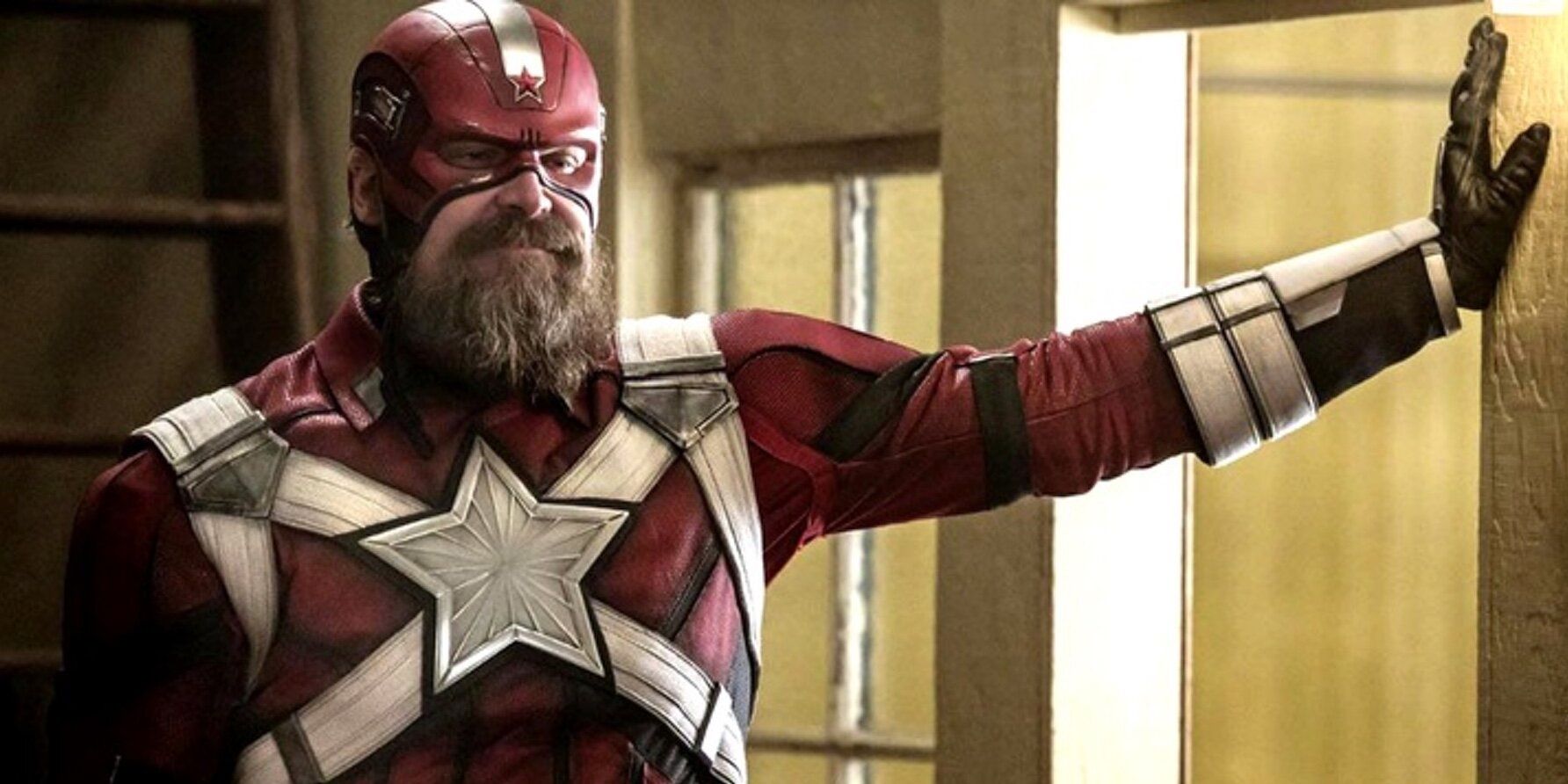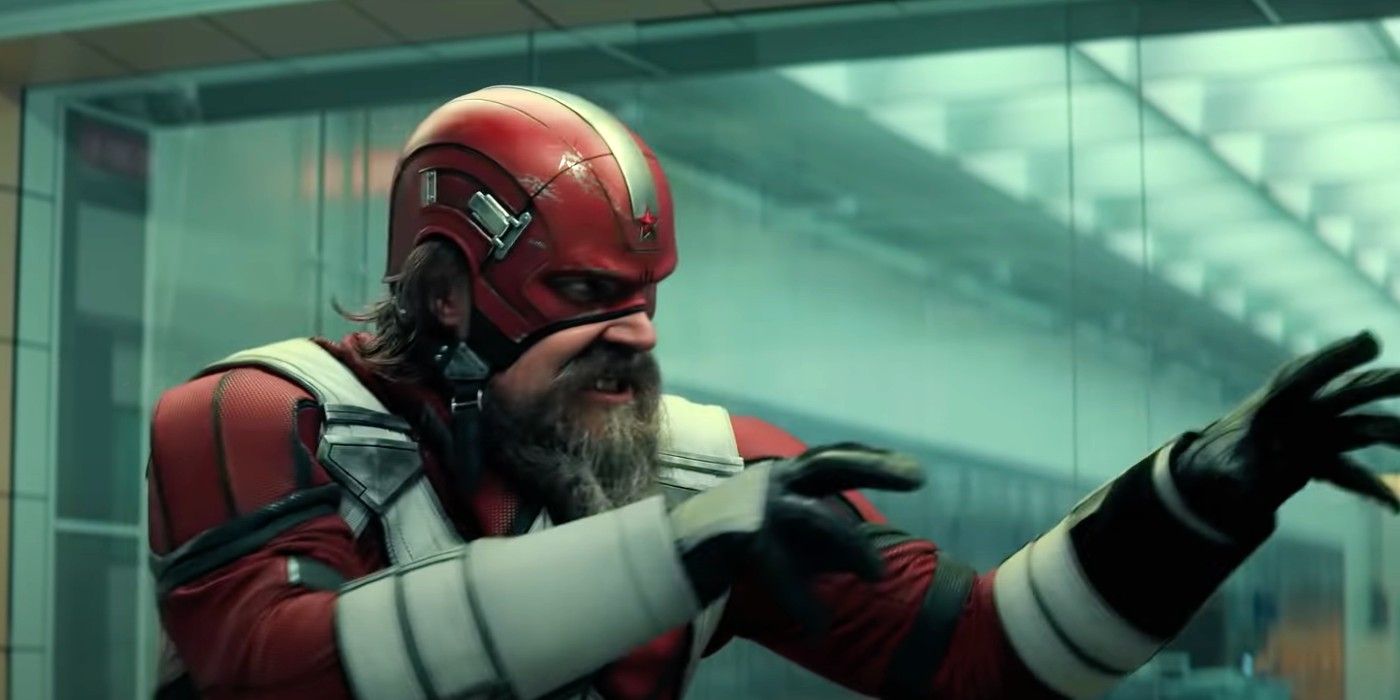Black Widow finally arrives in theaters and on Disney+ on July 9, after over a year of pandemic-related delays. The latest entry into the MCU focuses on family perhaps more than any other Marvel movie thus far, as audiences learn how Natasha’s first “second family” shaped the person she became.
David Harbour, who plays her so-called father Alexei, spoke to Screen Rant about building that onscreen bond and whether he’d like to explore the Red Guardian further.
We start with Alexei and his family in Ohio in 1995. How long was Alexei operating as the Red Guardian prior to that?
David Harbour: I think for quite a while. The interesting thing about him is he really does come to be his prime self, the Red Guardian, under the Soviet Republic. So I wanted him to have that feel, like he was a true Soviet. And then with the fall of the Soviet Union, that transition was hard for him.
I think there was this time that he went off to America and, as he says to Dreykov, he wants to get back into the action and not do this spy stuff. So, I think there was a good chunk of time when he really was the Red Guardian during the Cold War, when he was operating as that character.
There's a pride to the Red Guardian that makes him very charming. How do you balance that with his somber side?
David Harbour: I guess they're both born out of the same thing; it's the same egg. The silly pride is still born out of this tremendous guilt. To not feel that guilt, you have to have built up all this ego where you think that other people are against you, and that you're actually right in this situation.
And that that's so silly and so funny, but then when you actually let go of that ego and that narcissism and drop into the guilt, that's where the darkness is. So, they are both two sides of the same coin.
Do you think the Red Guardian could have grown to love staying in America?
David Harbour: Yeah, I think it's something that we talked about with Cate. We talked about this fake family they had in America for three years - I think we came up with the idea that it was three years. When Melina and him get back together, I think there is a deep bond. I mean, they probably were together; they slept in the same bed. They were like a family in a certain sense. And I think, even when they're about to leave in the beginning, she says something like, "I don't want to go."
They build some kind of life there. And he's committed to an ideology, beyond anything else. But I think part of the remorse is that the ideology betrays him, and he looks back on that period in his life when he was just driving around with little Yelena listening to Don McLean and thinks that was the highlight. How did he mess it up?
So, yeah, I think he could have had a beautiful life in America.

Speaking of that, the four of you have a very interesting family dynamic. What was your favorite part of diving into that? Can you talk to me about how some of them look back on that time very differently now?
David Harbour: Yeah, I think we all have different perspectives on that. And the very interesting thing is that they were young kids, while me and Rachel were adults. For them, it was far more confusing. Especially, there's a beautiful moment that Yelena has where she says it was real to her. And it's so heartbreaking, because how could you force a kid to do that?
The family dynamic in the future has all this depth and all this pathos, and yet it still has this real comedy to me, that is like dysfunctional families that get together and just push each other's buttons. When it's you in that dynamic, it's so frustrating and annoying and horrible, and you feel all that pain. But when you watch it happen to other people, it's just so funny, because it's so relatable in that way.
I think it was very well-observed. The oldest child, the most ambitious, the one who has the most pressure on her, and then the young baby who's treated a certain way. And the father and the mother: dad joke, almost puffed-up, egotistical, dumb ass father, and this mother who has a certain complexity and a bunch of secrets. I think it was all very well-observed as a cliche, and then embodying that was really fun.
What did you want to bring to Alexei that wasn't necessarily on the page when you got the script?
David Harbour: I think it was really the personal details of his particular journey, and to make those details as grounded as possible.
For example, the "American Pie" stuff wasn't in the script. That's something that Florence and I came up with. The scene was very well written that we had together, but I was like, "Wouldn't it be great if there's something a little personal before he left the room?" That he could say, without saying, "I tried as much as I could, but I know I failed you. But this is what I did." And we came up with this idea that maybe when she had trouble sleeping, because she was so terrified at night at such a transition, that he would drive around and put on this audiotape. She'd fall asleep to it, and it became this transitional object for her.
And even other things, like going around that dinner table with this stuff about Santa Claus. There's just so much improv that was going on throughout the day, because we were so silly with each other. Cate was so free in allowing us to do what we wanted to do, and the backstories we created for these characters were just so rich. It was just a blast. It started to topple on each other; it started to snowball, and then all these fresh ideas came out.
But a lot of the personal stuff in the family dynamic came from a combination of a great script, and then all of us getting together and being like, "How can we make this more deeply personal to us?" Most of the Melina and I stuff too. There's an entire other movie on the cutting room floor that's just me and Rachel Weisz flirting with each other. You can't put that in a Black Widow movie, but I loved her and I love working with her. We had such a soft affection for each other almost immediately, so we improv'd a lot around that stuff. It was very fun.
Why do you think that Alexei was so quick to dismiss his time in Ohio, and does he actually consider them his family in some capacity?
David Harbour: Oh, yeah. In the beginning of the movie, he makes this incredible choice that's very hard. You see him do this thing, and I think it's because he was committed to an ideology and committed to almost a career and a job - and the greater good; the greater cause. So, he sacrifices these kids. But I think you see in that moment that there's complexity there.
And then when the ideology betrays him and he's in prison, I don't think there's a day that goes by without him thinking about [them]. Because he was with these little girls for three years and, no matter what, they affected him tremendously to the point where when they show up - yeah, he makes some jobs, but I think it really weighs on him, how he treated them and what he did, and what he should have done as a man and as a father figure for them. And I think he wants redemption for that. He wants to make up for that.

Do you think we've seen the last of the Red Guardian? We kind of explore a little bit of them here, but there's more missions that he's been on in the past. And we also have the Winter Guard somewhere around.
David Harbour: I mean, I hope not. It always helps, if people like that character, to talk about it. Because I certainly would like to play more of that character. But I don't know.
They have such a big roster of characters, and a lot on their plate. But, yeah, I would love to play more. I'm ready to put the suit on again. So if people want that, I feel like Marvel will make room for it. But we'll have to see.
I watched another one of your films last night, No Sudden Move, which was amazing. What goes into you as an actor choosing which roles you're going to take? Because both are very different, but such amazing roles?
David Harbour: A lot of it has to do with the project, the director, and the people involved. Because I do find that like, a lot of times, great films come out of great directors even more so than a script. Getting the opportunity to work with Cate Shortland or getting the opportunity to work with Steven Soderbergh - these are legendary directors who are brilliant.
You just want to put yourself in camps where those people are leading the charge, because you know you'll be taken care of in a way that's really nice.
from ScreenRant - Feed https://ift.tt/3xmiy1Y



0 Comments